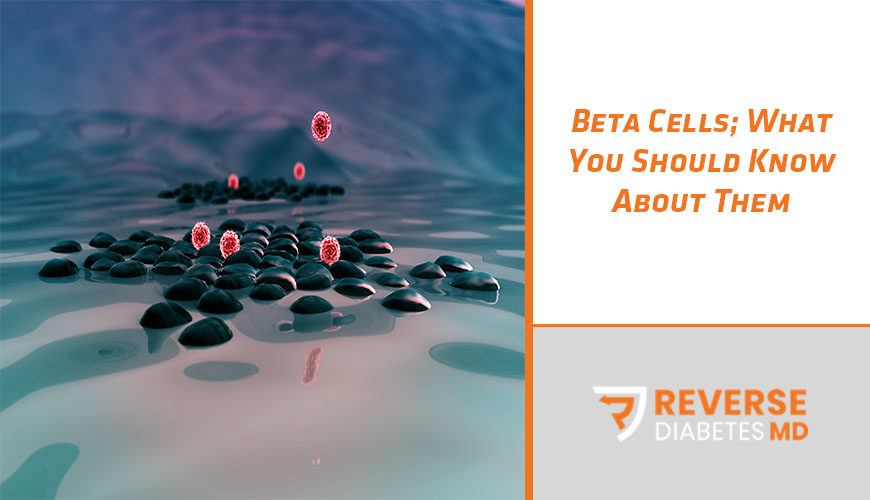The pancreas is an exocrine gland that produces two key hormones involved in the regulation of blood sugar: Insulin and Glucagon. Beta cells are distinctive cells within the pancreas that are responsible for the production of insulin. Why should you know about beta cells? Beta cells are linked to diabetes which is a disease of insulin resistance. Located within the islets of Langerhans (part of the pancreas), they’re one among a minimum of 5 differing types of islet cells that secrete hormones directly into the blood.
What is the role of beta cells?
The main role of beta cells is to provide and secrete insulin into the bloodstream when needed. When blood sugar levels begin to rise (e.g. when you are having a meal), beta cells quickly respond by secreting insulin into the bloodstream to take up the glucose being produced and store it in cells. Beta cells also increase the production of the hormone insulin in response to rising levels of glucose in the blood. This fast response to a spike in blood sugar typically takes about 10 minutes.
In people with diabetes, however, these cells are either attacked or destroyed by the system (type 1 diabetes), or become resistant to the effects of insulin (type 2 diabetes).
What Are Amylin and C-peptide
In addition to insulin, beta cells also produce two other products: Amylin and C-peptide, a byproduct of insulin production.
- Amylin slows the speed of glucose coming into the blood, making it a short-term regulator of blood sugar levels.
- C-peptide prevents vascular neuropathy as well as preventing the damage of arteries. You may have noticed that people suffering from severe diabetes will have problems with their nerves and sensation as well as arteries. This is due to the loss of this molecule when beta cells are destroyed.
C-peptide is secreted into the blood in equal quantities compared to insulin.
What Is The Role Of Beta Cells In Diabetes?
Type 1 Diabetes
In this type of diabetes, beta cells die from an immune attack; immune cells which normally fight harmful bacteria and viruses mistakenly destroys beta cells in the pancreas. How and why that happens isn’t clear, however, the results of a study published in early 2011 shows that these beta cells become stressed at the earliest stages of the illness.
In mice studies, cells respond to this stress by triggering a death pathway that leads to the loss of beta-cell function, and ultimately the loss of cell mass. In this case, stress on beta cells that results from an immune attack may be responsible for type 1 diabetes which mostly occurs in children. Type 1 diabetes has strong genetic links.
Type 2 Diabetes
In this type of diabetes, the body becomes immune to the effects of insulin, losing sensitivity to insulin over the course of time. Consequently, it tries to compensate by producing more insulin. Research has shown that chronically elevated blood sugar levels (chronic hyperglycemia) over a protracted amount of your time will result in beta cells burn out, which is also referred to as cell turnover. The exact cause of these is unclear; however, factors such as chronic low-grade inflammation could be contributing significantly.
Glucotoxicity which is the result of the accumulation of high levels of glucose is another factor as well. Other factors include the effects of lipoproteins, leptin, and cytokines which play a role in glucose regulation.
Insulin Resistance in Type 2 Diabetes
The beta cells of the pancreas work as extremely connected clusters called islets and their responses to rising blood sugar levels are coordinated by little groups of “leader cells.” Once blood sugar levels peak in blood, the leader cells are responsible for coordinating the other beta cells to initiate an appropriate response. It is possible that the leader cells are more metabolically active and more glucose-sensitive than the rest and they are the primary target for insulin resistance.
Insulin resistance in type 2 diabetes starts out with decreasing sensitivity to insulin which leads to an overproduction of insulin by the beta cells. Due to the increasing levels of insulin resistance, patients continue to suffer from elevated blood glucose levels with sweeping consequences. After a few years of sickness, internal insulin production dries up and patients need to start injecting insulin.
New Drug To Stimulate Growth of Beta Cells
Researchers from Mount Sinai Hospital have discovered a unique combination of medication that induces the growth of beta cells. The lead author of the study Andrew Stewart MD had this to say:
“We have discovered a drug combination that makes beta cells regenerate at rates that are suitable for treatment. The next big hurdle is figuring out how to deliver them directly to the pancreas.”
If beta cells can be stimulated to regenerate, then insulin resistance will no longer be an insurmountable obstacle for diabetics. If this new treatment is implemented it can provide the much-needed breakthrough in the treatment of diabetes.
- References
- Mayo Clinic: Type 2 diabetes. Retrieved from https://www.mayoclinic.org/diseases-conditions/type-2-diabetes/symptoms-causes/syc-20351193
- Mayo Clinic: Type 1 diabetes. Retrieved from https://www.mayoclinic.org/diseases-conditions/type-1-diabetes-in-children/symptoms-causes/syc-20355306
- NCBI (2008): Insulin signaling in the pancreatic beta-cell. Retrieved from https://www.ncbi.nlm.nih.gov/pubmed/18481923
- Science Daily (2018): Diabetes: New drug cocktail increases human beta cell proliferation at rapid rates. Retrieved from https://www.sciencedaily.com/releases/2018/12/181220111759.htm






